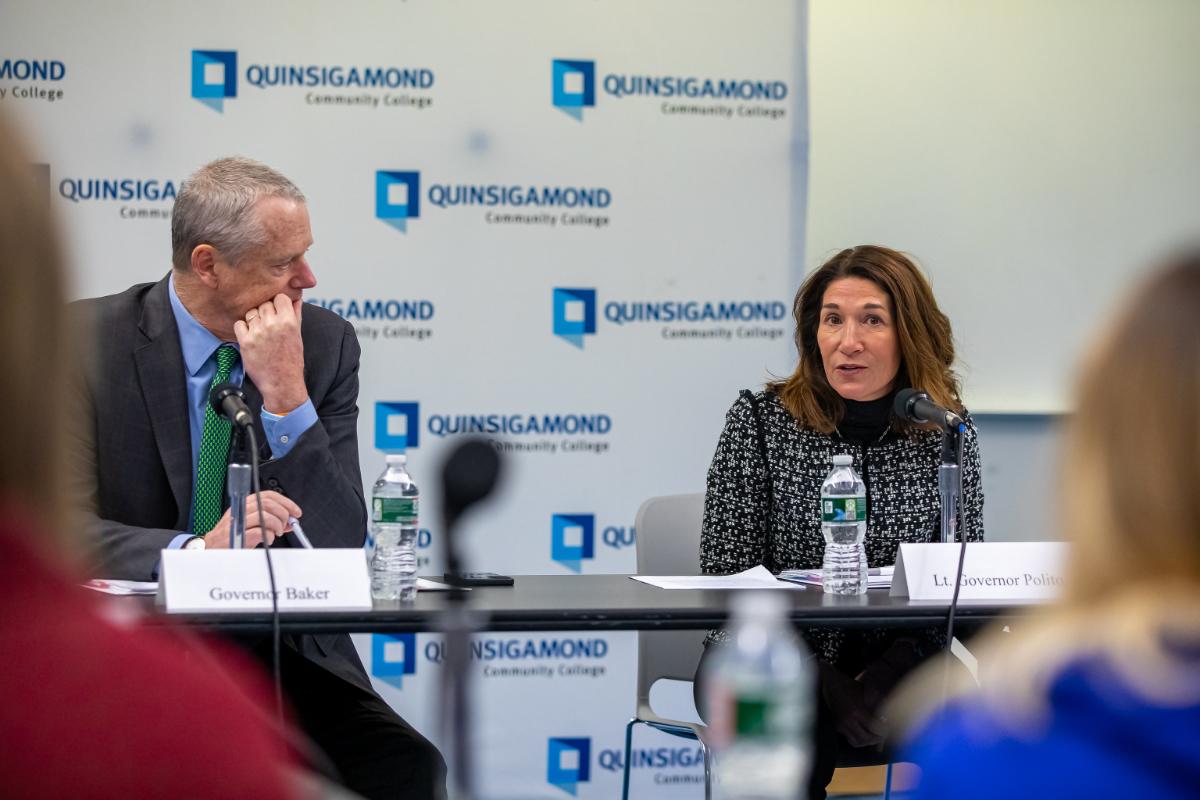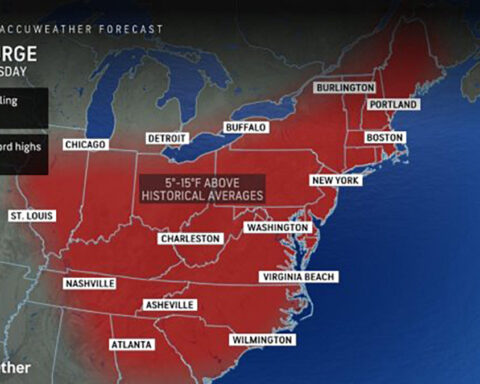Editor’s Note: The following article is derived from officially released information, published with few or no editorial changes. The Greylock Glass occasionally provides our readers with such content if the information is factual in nature, and requires little to no interpretation or analysis, often when original reportage would provide little to no additional relevant information.
WORCESTER – Wednesday, Governor Charlie Baker and Lt. Governor Karyn Polito joined Secretary of Public Safety and Security Terrence Reidy, survivors, advocates and law enforcement officials for a roundtable discussion highlighting the Administration’s dangerousness legislation, which, they say, would provide comprehensive new protections for survivors of sexual assault, domestic violence, exploitation and other crimes. This is the third regional roundtable since the legislation was refiled in December 2021. Other participants included representatives from Community VOICES, advocates from the Worcester County District Attorney’s Office of Victim Witness Services and other survivors who attended in support of the legislation.
Today’s roundtable is part of the Administration’s continued efforts to work with the survivor community to demonstrate the importance of its public safety proposals and deliver commonsense protections for survivors of violent crime. Similar roundtables were held in Plymouth in December 2021 and Springfield in March 2022, and Lt. Governor Karyn Polito testified on the legislative package in January before the Joint Committee on the Judiciary alongside survivors. The Administration continues to focus on the importance of survivors’ stories to demonstrate the human impact of the current gaps in the system, and the legislation has also been endorsed by the Massachusetts Office of Victims’ Assistance (MOVA).
“Hearing these survivors share their stories and the trauma they have lived with underscores the urgency with which we must act to close these loopholes and better protect survivors and communities,” said Governor Charlie Baker. “We are honored and grateful to work alongside the survivor and advocacy communities to make the case for this legislation so we can improve protections and prevent future stories like the ones we heard today. We urge the Legislature to move on these bills.”
“As Chair of the Governor’s Council to Address Sexual Assault and Domestic Violence, I have spent years working side by side with survivors, advocates and providers to deliver the resources and supports these resilient men and women need to live successful and safe lives,” said Lt. Governor Karyn Polito. “This legislation represents a critical next step we can take together to build on that work to improve protections for survivors and hold offenders accountable.”
“As noted by a survivor at a recent roundtable discussion, ‘it is a basic human right to feel safe,’” said Public Safety and Security Secretary Terrence Reidy. “Hearing the lived experience of survivors reinforces the urgent need for Massachusetts to strengthen the dangerousness law and enact common sense changes to protect vulnerable citizens who deserve better.”
“This bill brings needed changes so we can better protect victims and the community from dangerous individuals,” said Worcester County District Attorney Joseph Early. “As prosecutors, this is our main goal when we request a dangerousness hearing. This commonsense legislation is much-needed and closes loopholes that prevent us from fulfilling our goal of advocating for victims and protecting the community.”
“Today’s roundtable participants illustrated the impact of living in fear, which can only be addressed through safeguards that do not exist in the Commonwealth’s current law,” said Jennifer Lane, President of Community Voices. “Community Voices supports this legislation because it empowers survivors of traumatic abuse with the critical protections needed to begin the healing process and rebuild their lives. Communities become less safe when we ignore Voices of Survivors!”
An Act to Protect Victims of Crimes and the Public: First filed in 2018, the Administration’s proposal would expand the list of offenses that can provide grounds for a dangerousness hearing and close certain loopholes at the start and end of the criminal process that currently limit or prevent effective action to address legitimate safety concerns. It would strengthen the ability of judges to enforce the conditions of pre-trial release by empowering police to detain people who they observe violating court-ordered release conditions; current law does not allow this, and instead requires a court to first issue a warrant. Under this proposal, judges will be empowered to revoke a person’s release when the offender has violated a court-ordered condition, such as an order to stay away from a victim, or from a public playground. Current law requires an additional finding of dangerousness before release may be revoked.
The legislation also expands the list of offenses which can provide grounds for a dangerousness hearing including crimes of sexual abuse and crimes of threatened or potential violence. It also follows the long-standing federal model in including a defendant’s history of serious criminal convictions as grounds that may warrant a dangerousness hearing. Current law requires courts to focus only on the crime charged and ignore a defendant’s criminal history when determining whether the defendant may be the subject of this sort of hearing.
An Act Relative to the Harmful Distribution of Sexually Explicit Visual Materials: First filed in 2017, this legislation seeks to close a loophole under current law by creating penalties for adults who distribute a sexually explicit image for purposes of revenge or embarrassment. While current law addresses non-consensual recording of an unsuspecting person, it does not address instances where someone distributes an image without consent regardless of whether the initial image may have been taken with consent. This legislation closes the gap in state law by creating a new felony offense and empowering judges in criminal proceedings to ensure an explicit image in question is permanently destroyed.

















